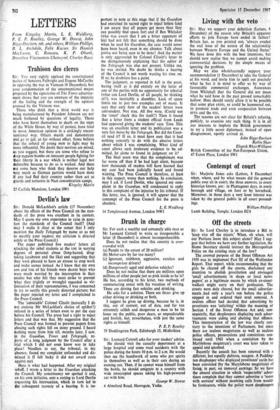Devlin's law
Sir: Donald McLachlan's article (17 November) about the effects of the Press Council on the stan- dards of the press was excellent in its context. May I quote my own experience to raise in ques- tion the standards of the Council itself? (And may I make it clear at the outset that I only mention the Daily Telegraph by name so as not to mystify your readers; my criticism is directed solely at the Press Council.) The paper published five readers' letters all attacking the rebel students at the LSE in varying degrees of personal abuse (long-haired, drug- taking layabouts and the like) and suggesting that they were pleased to have an excuse to stop work and make scenes instead. As I knew that my own son and lots of his friends were decent boys who were much worried by the interruption in their studies but who felt they must strike to prevent pat they (rightly or wrongly) regarded as vic- isation of their representatives, I was concerned to try to rectify this grossly distorted picture; but the paper rejected my letter and I complained to the Press Council.
The 'admirable' Colonel Clissitt (naturally I do not endorse Mr McLachlan's choice of epithet!) refused in a series of letters even to put the case before his Council. The press had a right to reject letters and that was that. My suggestion that the Press Council was formed to prevent papers from abusing such rights fell on stony ground. I heard nothing more from him till, months later, I saw, In the Guardian, Times and Telegraph, re- Ports of a long judgment by the Council after a trial which I did not even know was to take place! Needless to say, the tribunal, in my absence, found my complaint unfounded and dis- ffiissed it (I felt lucky it did not award costs against me).
Here is what had happened. After my original rebuff, I wrote a letter to the Guardian attacking the Council. My constituency MP spotted it and, on his own initiative, sent a cutting to Lott Devlin requesting his intervention, which in turn led to the subsequent travesty of a hearing. It is im- portant to note at this stage that if the Guardian had exercised its sacred right to reject letters (and I am aware that all papers get more than they can possibly find space for) and if Ben Whitaker (who was aware that I am a bitter opponent of his) had not felt that something should be done when he read his Guardian, the case would never have been heard, even in my absence. Talk about justice not being seen to be done! And the matter is only aggravated by Colonel Clissitt's letter to me disingenuously explaining that the editor of the Telegraph was also not present. Unlike me, he was invited. No doubt he thinks a hearing of the Council is not worth wasting his time on. If so, he doubtless has a point.
The judgment, as reported in full in the press, basing itself as it did entirely on the letter of one of the parties with no opportunity for rebuttal (what can Lord Devlin, of all people, be thinking of?), was inevitably a shambles. Lack of space limits me to just two examples out of many. It says that only four of the readers' letters were anti-student. Not true. All five were. (Could not the 'court' check this for itself?) Then it found that a letter from a student official from Leeds had appeared giving the students' case. True. This was an excellent letter and its publication was a very fair move by the Telegraph. But did the Coun- cil read it? If so, it must have seen that it had nothing remotely to do with the abusive letters about which I was complaining. What kind of court allows such irrelevant evidence to be ad- mitted, let alone to found its judgment on it?
The final score was that the complainant was far worse off than if he had kept silent, because now thousands of readers will have learned that my case had been judicially heard and found wanting. The Press Council is therefore, at least in this respect, worse than nothing. In conclusion, may I ask if Lord Devlin, who ignored my com-
plaint in the Guardian, will condescend to reply to this complaint of the injustice by his tribunal. If
this letter, too, is ignored, it will appear that the contempt of the Press Council for the press is absolute.
L. E. Weidberg 14 Templewood Avenue, London NW3


































 Previous page
Previous page